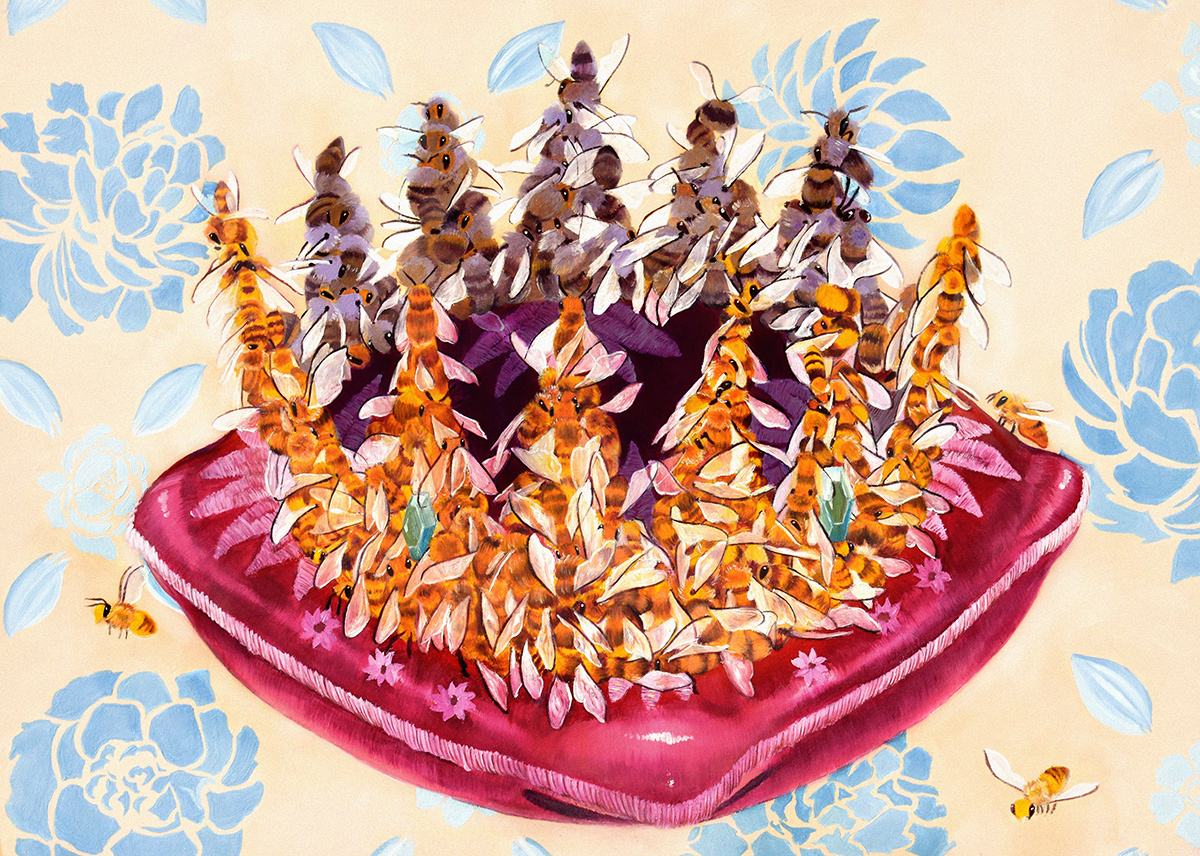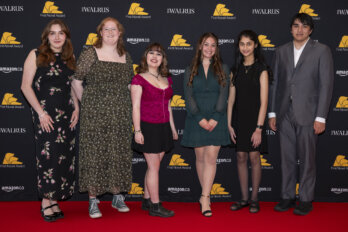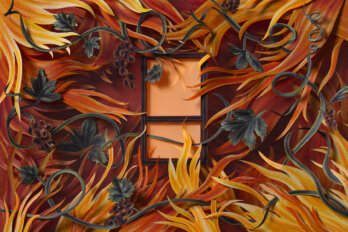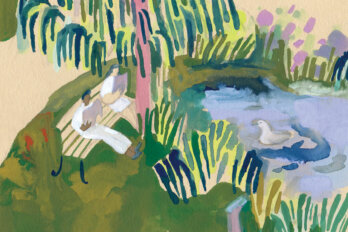Listen to an audio version of this fiction story
For more audio from The Walrus, subscribe to AMI-audio podcasts on iTunes.
It’s another bright, blistering day, and I’m visiting from the city. Mother and Aunt Phyl are fighting and I’m too hot to let them drag me into it, though it has pointedly got something to do with me.
I can see Aunt Phyl’s blood rise up her neck in cumulonimbus blotches. “Like it would kill you if I got to go away somewhere,” she says, “instead of slow roasting to death in here.”
“Believe me, there are plenty of places I’d love for you to go,” Mother says as she steams through the dining room.
The air in the house is blue with tobacco smoke. I fear it might damage the sensitivity of my palate, but I can’t slip outside because the place is surrounded by placard-bearing protesters, camera crews, and cops, who are ostensibly there to protect us from the mob but are straining to peek in the windows as much as anybody else. So I’m squeezed into the patchy shade of an indoor lemon tree, playing a sweaty round of Texas Hold ’Em with Aunt Phyl and riffling through a cookbook so no one will try to talk to me while I wait for my turn.
Mother has been keeping all the windows shut in a feeble attempt to dampen the din from outside. Shiny sequins of dead bees crisp on the sills. It’s Aunt Phyl’s deal, but she’s taking forever to shuffle. Instead, she’s flourishing half the cards like a fan in front of her face. “Come on, Gretel,” she calls over to Mother. “You’ve got to crack a window or something.” She sniffs at the air as though she’s assessing a left bank Cabernet. “This place is riper than a pig’s armpits.”
I’ve been here only a few hours, but I don’t know how much longer I can stay locked inside with Mother’s prying oyster eyes and the maddening drone of my father’s beehive. You’d think the swarm would be quieter, given that it’s supposedly dying, but the bees continue to swaddle and shape his head like it’s business as usual.
The commotion has agitated the hive. A ball of bees flies out from where my father lies napping in his bed of wildflowers.
A raucous cheer erupts outside, followed by a bang against the living room window. Someone has broken through the barrier and slapped a sign against the glass: Save the Bees or We Won’t Be! Three police amble over. The sign falls, revealing the face of Mr. Burtch, my high school guidance counsellor, as he’s dragged away.
The commotion has agitated the hive. A ball of bees flies out from where my father lies napping in his bed of wildflowers. Mother lights another cigarette, blows a stream of smoke, and the bees retreat.
For eight generations, the hive has been handed down, father to son. They say it’s something in our genes, though the scientists studying our case have yet to convincingly explain it. Whatever the cause, our heads host bees that are highly productive, disease resilient, and wrapped in extra shaggy coats. It’s something of a symbiotic relationship: the local farms are flourishing, and with my father’s help, the town has become a tourist destination, a fruitful blend of nature preserve and
freak show.
With bee populations in peril, my parents have taken what Mother refers to as “great pains” to keep the hive healthy. They eat local, never use cars or air conditioning, and renovated their 1970s split level into a glassy, floral sanctuary. Every day from April through October, since long before I was born, my father has wandered the orchards, bobbing from farm to farm with his teeming drift of a head. Tomorrow is his sixty-fifth birthday, and as Mother keeps reminding me, he’s hoping to retire.
Mother is in the kitchen, fixing herself a drink. Phyl follows and mixes another of her signature cocktails: brandy with white crème de menthe. A couple of rogue bees have zoomed in over the pony wall and are whizzing around them. “One of these stings you, Phyl, and I can’t promise I’ll be able to find an epi kit.”
Aunt Phyl scoffs, mutters her usual “people in glass houses” line, returns to the table, reshuffles the cards. I glance up from my book and catch her peering over at me. “What do you do with yourself in the city, Otto?” She sets her cards down and takes a sluggish puff on her cigar, smoke curling between her lips. “Maybe I should try the urban life.”
“What he’s been doing is racking up debt trying to become the next Julia Child,” Mother says as she sweeps by. I can tell she’s drinking daiquiris: rum sharpens her voice into barbed points. “Yet he’s never seemed interested in making dinner for us.”
“Perhaps we could make a deal.” One of Phyl’s leaky grey eyes droops into a wink. “Help each other out.”
I summon what I hope is a contemplative smile and cast my eyes back into the book.
“Well if it isn’t my chef d’œuvre, come to cook in my greenhouse.” When my father speaks, the words flow slow and thick, as if his mouth is full of honey. He’s always been something to behold, with a head like a throbbing mass of pinstriped velvet. Today, though, what I can see of him looks tense and tired. “Have you talked to your mother?”
Phyl hacks loudly and spits into a tissue. I point toward the den. “She’s watching TV.”
He nods. His bees hum. A silence grows between us.
My father and I have never been close. On top of the obvious physical barrier, we’ve just never found much to say to each other. He shuffles to the window and peeks out at the crowd. “Phyl says your role in my swan song has ruffled some feathers.” He pauses as though he has more to say. Instead, he wanders off toward his indoor garden. Phyl spits again into her ball of damp tissue and pushes it up her sleeve.
I worry about the fate of bees too. I know the hive will die in the absence of an heir. I know bee populations are in peril and farmers elsewhere are already pollinating their crops with Q-tips and vibrators. But people have known for decades that the bees were in trouble. I don’t think it’s unreasonable that I don’t want to fuzz over the best years of my life in a haze of dandelion wine so I can handle walking around with a living hive for a head.
I’m taking a different path. My father’s not allowed in restaurants; I was thirteen before I ever ate in one: La Mirabelle. The nimble service, the tap and tinkle of silver and glass, the entrees like paintings on plates—it all made me swoon. On my way to the bathroom, I caught a glimpse of the kitchen’s white light, the stirring scents, the coordinated speed. I wanted to be in the middle of it, to speak the secret language and be swept up in the current of its fluid synchronization. For the first time, I felt that there was someplace I belonged.
Of course, when I try to share this new dream with my parents, all my father can talk about is the unknown provenance of the produce I plan to cook.
I‘m on a roll. Aunt Phyl won the first couple of hands, but now I’ve got my game back. She doesn’t seem to be taking it well. She keeps muttering, “You know it’s a raw deal. You know it is.” I set the book on the floor and up the ante, pushing a stack of chips into the pot.
“You don’t have to do this,” she hisses, eyes on the kitchen doorway.
I lean back in my chair. I have a pair of queens. “Sure, but why wouldn’t I?”
Her blood flares in red blooms up her cheeks. She leans toward me. “Listen, boy, or you’ll end up—” Mother emerges and Phyl starts hacking again.
“I call,” I say. She flips the last card and I lay mine on the table—a full house.
“Why don’t you take a nap before dinner?” Mother offers. I appreciate the excuse to leave the room. The heat has had a soporific effect.
I walk down the hall, trailed by the shrill scraps of Mother and Phyl reviving their quarrel.
“I swear to God, Phyl, I know what you’re playing at.”
“I’m just thinking of the boy.”
“Yes, well, I’m thinking of everybody.”
The guest room used to be my room. It’s the only space in the house with no plants; instead, it has recently been wallpapered into an English garden. The curtains are closed, so it’s comparatively cool.
I click on the television to the local news. Behind the correspondent, I recognize the outside of my parents’ house, surrounded by vans and lawn chairs and a dark flock of microphones and cameras and people.
“We’re here live following the story of what may be the latest extinction event of our age. We’re still waiting for a report from inside, but the crowd out here is very emotional.”
The camera swings around as the mob behind the newscaster starts to move. The sea of bodies is parting to let someone through. It looks like—it is—Mother. A cheer goes up on the television just as a cheer sounds from outside.
Someone passes her a megaphone. Mother takes a drag on her cigarette and then lifts the bullhorn to her mouth. “I know you all recognize the importance of the bees.” Another cheer. “So it is my immense pleasure to announce that, just this week, there’s been a breakthrough. It is now possible for one of you to take the hive. A simple cheek swab will show if you’re a match.”
I hold my breath. A wary sliver of something electric—vindication? relief?—flickers in my heart. But then the camera lingers on Mother, and I see her right eye twitch. She’s bluffing. “Who among you will volunteer?”
The crowd is silent. Nobody moves. Mother takes another haul on her cigarette. Smoke rushes from her nostrils. She scowls at the chastened townspeople and strides back into the house.
It was a lie, I know, but still, warmth washes over me as I settle back into the floral bedding. She was defending me.
I awake with a start. Mother is hovering over me, blowing smoke from three cigarettes. There’s a man beside her, a stranger, spritzing water on my face.
“We hoped it wouldn’t come to this,” Mother says, her lips wringing out smoke in dirty grey ropes. A few bees scout the room, whirring past my ears.
I try to sit up. I’m tied down. The man lights a cigar. His voice is slack and treacly. “Take it easy, son. Stay calm.” His pale, pocky face is at once familiar and strange. “Dad?!”
He swings the cigar like a censer. That’s when I see the hive, massed in a teardrop shape, dangling off the only hanger in the open closet. The tight cluster hums.
I writhe and twist and kick until Mother engulfs me in a woolly plume of Marlboro. The smoke casts its spell and I wilt inward like a limp balloon. As though on cue, the bulk of the swarm lifts from the hanger and the room fills with bees, swirling like ash from a volcano. There is a moment of chaos before they throng toward my head, landing in surges, crawling over my face and neck, thick and warm, encasing me in a teeming balaclava.
“They would have died,” Mother says, her voice muffled and distant. “You didn’t want that, did you?”
“Listen,” my father says. “The bees will lick the water off you and off one another. That will bond you all for life.” I would have expected his voice to be lighter, quicker, without the hive, but each word still seeps out slowly, as though shouldering a great weight. “We can’t afford to lose the bees, son. No one can.”
I peer through the shroud. Everything is fuzzy, out of focus. My father spritzes me and puffs on his cigar. I can’t read his expression. He looks away from me, toward Mother, and when he turns back, his tone is all business. “I have to get at least five kilometres away from the new hive, pronto.”
Mother chimes in, “We’re leaving for Europe.” Then, after a glance toward my father, “We got a little compensation. Your father worked hard all his life . . . ”
“It’s a speaking tour.” My father looks away, his small head slightly bowed.
I’m overcome with the oddest sensation, the tingle of thousands of wet eyelashes blinking against my skin, soothing me until I am almost calm. My father bends down and unties my arms. “We hoped you’d come around on your own, son,” he says. “You have to understand. The farmers need this, the town—it could help the whole world.”
In my slow-motion daydream, I watch my parents hover over me. Their mouths move, but their voices merge and blur, meaning reduced to melody. Or maybe it’s something else. Maybe the crowd outside is bursting into song. From my myopic vantage, I can see only the bees near my eyes and on my nose, but I can hear them all. The speed, the scent, the thousands of secret, staticky conversations. Around me, the hive is a synchronized hub of communication and coordination, and I am right here, watching. I am almost inside. I am this close.





